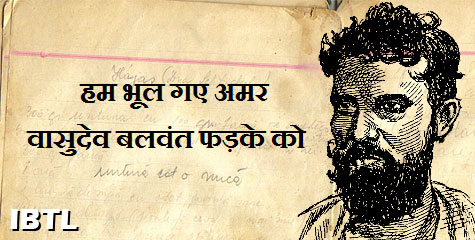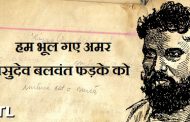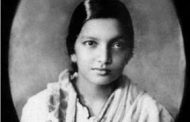Vasudev Balwant Phadke – was an independence activist and revolutionary who sought India’s independence from British. Phadke was moved by the plight of the farmer community during British Raj. Phadke believed that Swaraj was the only remedy for their ills. With the help of the Koli, Bhil and Dhangar communities in Maharashtra, Vasudev formed a revolutionary group of Ramoshi. The group started an armed struggle to overthrow the British Raj. The group launched raids on rich English businessmen to obtain funds for their liberation struggle. Phadke came into limelight when he got control of the city of Pune for a few days when he caught the British soldiers off guard during one of his surprise attacks.
Phadke was born on 4 November 1845 in Shirdhon village of Panvel taluka based in Raigad district in Maharashtra state in a Chitpavan Brahmin family. As a child he preferred learning skills like wrestling, riding over high school education and dropped out of school. Eventually he moved to Pune and took the job as a clerk with military accounts department in Punefull for 15 years. Krantiveer Lahuji Vastad Salve a then prominent social figure based in Pune was his mentor. Salve, an expert wrestler, operated a TALIM (training center for wrestling). Salve preached the importance of independence from British Raj. Salve belonged to the Mang community, an untouchable community, taught Phadke the importance of getting backward castes into mainstream freedom movement. It was during this period that Phadke began attending lectures by Mahadeo Govind Ranade which mainly focused on how the British Raj policies hurt the Indian economy. Phadke was deeply hurt by how this was leading to widespread suffering in the society. In 1870, he joined a public agitation in Pune that was aimed at addressing people’s grievances. Phadke founded an institution, the Aikya Vardhini Sabha, to educate the youth. While working as clerk, he was not able to see his dying mother due to the delay in approval of his leave. This incident enraged Phadke and happened to be the turning point in his life.
In 1860, along fellow social reformers and revolutionaries Laxman Narhar Indapurkar and Waman Prabhakar Bhave, Phadke co-founded the Poona Native Institution (PNI) which later went on to be renamed the Maharashtra Education Society (MES). Through the PNI, he went on set up Bhave School in Pune. Today, the MES runs over 77 institutions in various parts of Maharashtra.
In 1875, after the then Gaikwad ruler of Baroda was deposed by the British, Phadke launched protest speeches against the government. Severe famine coupled with the evident apathy of the British administration propelled him to tour the Deccan region, urging people to strive for a free republic. Unable to get support from the educated classes, he gathered a band of people from the Ramoshi caste. People from the Kolis, Bhils and Dhangars were also included later. He taught himself to shoot, ride and fence. He organised around 300 men into an insurgent group that aimed at liberating India from British rule. Phadke intended to build an army of own but lacking funds they decided to break into government treasuries. The first raid was done in a village called Dhamari in Shirur taluka in Pune district. The income tax which was collected for British Raj was kept in the house of local business man Mr. Balchand Fojmal Sankla. They attacked the house and took the money for the benefit of famine stricken villagers. There they collected about four hundred rupees but this led to his being branded as a dacoit. To save himself Phadke had to flee from village to village, sheltered by his sympathisers and well-wishers, mostly the lower class of the society. Impressed by his zeal and determination, the villagers of Nanagaum offered him protection and cover in the local forest. The general plot would be to cut off all the communications of British forces and then raid the treasury. The main purpose of these raids was to feed famine-affected farmer communities. Phadke performed many such raids in areas near Shirur and Khed talukas in Pune.
Meanwhile, the leader of Ramoshi, Daulatrav Naik, who was the main supporter of Phadke, headed towards the Konkan area on the western coast. On 10–11 May 1879, they raided Palaspe and Chikhali, looting around 1.5 lakh rupees. While returning towards Ghat Matha, Major Daniel attacked Naik, who was shot dead. His death was a setback to Phadke’s revolt: the loss of support forced him to move south to the Shri Shaila Mallikarjun shrine. Later, Phadke recruited about 500 Rohilas to begin a fresh fight.
Phadke’s plans to organize several simultaneously attacks against the British Raj nationwide were met with very limited success. He once had a direct engagement with the British army in the village of Ghanur, whereafter the government offered a bounty for his capture. Not to be outdone, Phadke in turned offered a bounty for the capture of the Governor of Bombay, announced a reward for the killing of each European, and issued other threats to the government. He then fled to Hyderabad State to recruit Rohilla and Arabs into his organisation. A British Major, Henry William Daniell and Abdul Haque, Police Commissioner to the Nizam of Hyderabad, pursued the fleeing Phadke day and night. The British move to offer a bounty for his capture met with success: someone betrayed Phadke, and he was captured in a temple after a fierce fight at the district of Kaladgi on 20 July 1879 while he was on his way to Pandharpur.
From here he was taken to Pune for trial. Ganesh Vasudeo Joshi, also known as Sarvajanik Kaka, defended his case.Phadke and his comrades were housed in the district session court jail building, near Sangam bridge, which now happens to be the state C.I.D. building. His own diary provided evidence to have him sentenced for life. Phadke was transported to jail at Aden, but escaped from the prison by taking the door off from its hinges on 13 February 1883. But his escape was too short lived: he was recaptured and put back in prison. Phadke then went on a hunger strike unto death and died on 17 February 1883.photo from social media





